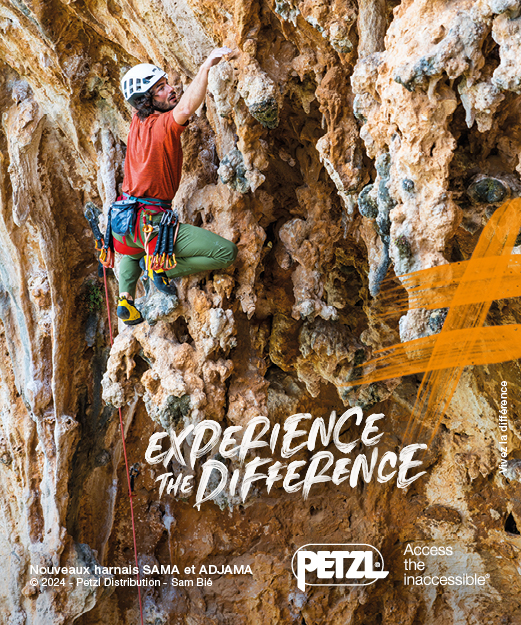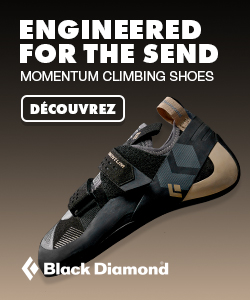Udo Neuman : “performance sports is interesting if it enriches the life”

The fourth International Rock Climbing Research Congress is to be held in Chamonix, France from 9th to 14th July 2018. The conference will highlight the latest results from world leading researchers in the field of climbing. A training day will be organized on Saturday, July 14, 2018, in order to share the experience of the best international coaches and spread this experience to as many people as possible. Udo Neuman, the iconic german coach, will be present.
Udo Neuman, how could you introduce yourself in few words ?
Born 1963, started climbing for real in 1982. I came to climbing because I enjoyed bouldering after kayaking the Ardeche (for example) and wanted to do that more. I had competed in eau vivre white water kayaking and was looking for a non-completive, more experience based outlet of my ambition. Competed in climbing too though, eg in Troubat in 1987, as I am schizophrenic if it comes to performance.

At the beginning, my climbing was mostly buildering in Cologne with trips to Bleau spread in. Vacations were mostly to the sport climbing destinations of the time in France, Spain an the US. Climbed everything from Boulders to Bigwall, no ice and snow though. Nowadays I mostly boulder and am a nature traceur.
Got a Masters degree In Sport sciences in 1989, my thesis was about performance deciding factors in competition climbing. While studying, I coached kayaking, later also a kids circus and performing acrobats, dancers and mimes. Performed myself in movement theater.

What was your cursus to become a national trainer ?
No formal cursus. I should mention that I was and am never employed, but a freelancer for the German federation. Quite frankly, now I think that I enjoyed the freedom to try out all these crazy ideas only because the federation couldn’t care less about bouldering !
What’s your philosophy of training and what is the most important for you when you coach top level climbers ?
As mentioned above, I’m a bit schizophrenic if it comes to performance sports. Or maybe digital, either on or off. I’m skeptical if performance sports is something a person should make the center of his or her life. I’ve seen many examples where sport became a burden on the life of people more than enrich it. For me, performance sports is only interesting if it enriches your life, regardless of outcome.

It did it for me, I like to look back to my life as an athlete, even if many situations where unpleasant at the time. I want my athlete to look back to their sports career as something positive. The most important for me is that whatever we do has some intrinsic value in- and itself. It is process oriented. Having said this, if you tell me performance sports is what you want to do, I’m all in. Not constantly trying to improve and working on your weaknesses is not acceptable to me !
Sport climbing has become an olympic sport. Udo Neuman, for you, what will it change for training ? What are the implications of the choice the IFSC to introduce the boulder/speed/lead combined ?
The format itself is very interesting to me, since the challenge is to unite all these conflicting issues. The physical side is rather trivial, at least till Tokyo. You have to have some base endurance, but mainly improve your maximum strength and mobility and do some strength endurance a couple of weeks before the event. The bigger challenge is your technique and head and to adapt quickly to the different demands.

How the boulder training can draw on methodologies that are known to work in other sports?
Methodology wise I like to think of climbing as the original implicit learning based activity since everything we do is constraint based. Other activities try really hard to incorporate more of that in their exercising. On the other hand, much of what is happening in climbing right now doesn’t even deserve the term training, “exorcising” would be more fitting ! Personally for me at this point the challenge is more in appreciating the uniqueness of climbing.

For example the limited contact points and climbings’ unique body tension. In gymnastics for example it is never a problem how much force you can transfer. Whereas in climbing interaction forces are one of the most distinguishing factors. We can learn that from no other activity. But we have to look at other animals. Or wait for somebody like Janja to show us. For next generation climbing, gaze behavior is something we can learn from dancers and any activity where aiming is important.
Udo Neuman, what are your expectations about the IRCRA congress of Chamonix ?
To share and discuss the mentioned issues more in -deepth.
What is the better way to improve the dissemination of the scientific knowledge to local or regional trainers, in the aim to improve the overall level of climbing ?
There is a strong wish in parts of the climbing communities to preserve the status quo, to only deal with climbing the way it was dealt with when sport climbing started in the eighties. Many influential people are afraid to loose their status in their club or federation if the general acceptance is that climbing has moved on.

This is true across all fields, from research to training and in every country. I find most specific climbing research just not very relevant and the Dunning–Kruger effect present everywhere. Its such a disconnect from what is happening in every bouldering gym around the world, where ten-year-olds climb in ways older people just can’t. This is what I wish for climbing. That we approach it as kids – assuming nothing and take it from there !
Udo Neuman, do you think there are enough exchanges of knowledge between the nations and générations ?
No !









No Responses
[…] also the interview of one of the german coaches, Udo Neumann and Urs […]